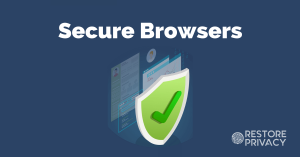 Thanks to Best VPN Canada for this guest post by By
Thanks to Best VPN Canada for this guest post by By
Why Private Browsing is Not Enough
The main issue that is always associated with browser security and privacy is that users want to keep their accounts logged in while browsing on the internet. This is a dilemma because it gives sites permission to monitor and pry on your browsing activity and expose your true identity.
One effective solution to resolve this issue is by using browser compartmentalization. This involves the process of using different browsers for each browsing activity. Take this example:
- Use browser #1 for opening your online accounts that have a password.
- Use browser #2 for safe browsing online. You have to incorporate several configurations to carry out this browsing activity such as private mode and no history or cookies recorded on the browser.
- Use browser #3 when you want to execute safe browsing with optimum security and privacy.
Furthermore, you can also use numerous browsers, configured just how you want it, for a specific use, depending on the threat that you wanted to avoid or the activities you wanted to execute. The key to successful and effective browser compartmentalization is powerful security for every browser. You should also be consistent with using each browser for their specific purpose only.
Under browser compartmentalization, you can also use virtual machines since they work great in offering security and privacy. To do this, you can run Linux VMs via VirtualBox on your main computer. Lastly, you should use a reliable secure password manager, just like LastPass, KeePass, or Bitwarden.
Another thing to consider when altering the settings of your browser is that you can install plenty of different extensions or add-ons to upgrade your browser’s security and privacy.
Below are the options that you can utilize to improve the performance of your browser, just take note that not all of them might be compatible with the browser that you are using.
- HTTPS Everywhere – this add-on was developed by the team behind Electronic Frontier Foundation. This will reinforce the website to use private HTTPS encrypted protection.
- Privacy Badger – another add-on from EFF that prevents trackers and malicious ads.
- Cookie Autodelete – this automatically removes cookies that are not needed in the browser.
- uMatrix – this gives you overall control to all the requests that are monitoring you as you jump from site to site. This requires intensive configuration.
- uBlock Origin – this is one of the most effective browser-based ad blockers out there. It also safeguards you against unwanted tracking.
- Decentraleyes – this offers security against tracking through content delivery networks.
- NoScript – this lets you personalize the scripts that you want to run on the sites you visit. Just like uMatrix, this one is intended for users with advanced knowledge on the configuration.
Pro-tip: be extremely careful when using browser extensions and third-party add-ons. Make sure you perform extensive research first. This is because add-ons can act as data collection equipment and spyware for third parties. This is the case with browser proxy add-ons and VPN services, even if they are recognized by legitimate sources such as Apple and Google Play stores.
Conclusion (And What You Need To Know!)
An expertly-customized browser is vital for the security and privacy of your data since it enables safe browsing on the internet. Aside from this, you should also consider utilizing the following:
- Adblocker – if you think ads are simply ads, think again. Today, ads are widely-used as a means to collect data or track your browsing whereabouts. It spies on your activity, which is how third-parties acquire your data profile and send you personalized ads – smart but creepy.
- VPN (a virtual private network) – VPNs are engineered to encrypt and maintain the anonymity of your internet traffic, while also concealing your true location and IP address. Since the majority of internet providers pry on your browsing activity, having a trustworthy VPN service is a must.
Also, you may want to safeguard yourself from device or browser fingerprinting, which can reveal your true identity even if you are subscribed to an excellent VPN service. If you want to hide your shopping activity for a family member’s birthday present, you can always rely on private mode. It is also dubbed as porn mode – which also makes sense.
However, its perks end there. Switching to private mode won’t give you deeper privacy against the prying eyes of third-parties. You’ll still need the services of a VPN to cover your IP address and restrict web tracking. All the secure browsers mentioned in this article are open source and they deliver optimum security and safety that’s more reliable than Safari, Chrome, or Internet Explorer.
JAN




About the Author:
I am a cybersecurity and IT instructor, cybersecurity analyst, pen-tester, trainer, and speaker. I am an owner of the WyzCo Group Inc. In addition to consulting on security products and services, I also conduct security audits, compliance audits, vulnerability assessments and penetration tests. I also teach Cybersecurity Awareness Training classes. I work as an information technology and cybersecurity instructor for several training and certification organizations. I have worked in corporate, military, government, and workforce development training environments I am a frequent speaker at professional conferences such as the Minnesota Bloggers Conference, Secure360 Security Conference in 2016, 2017, 2018, 2019, the (ISC)2 World Congress 2016, and the ISSA International Conference 2017, and many local community organizations, including Chambers of Commerce, SCORE, and several school districts. I have been blogging on cybersecurity since 2006 at http://wyzguyscybersecurity.com